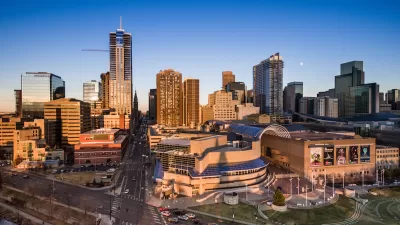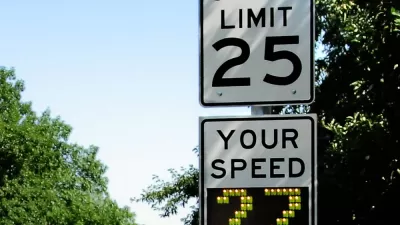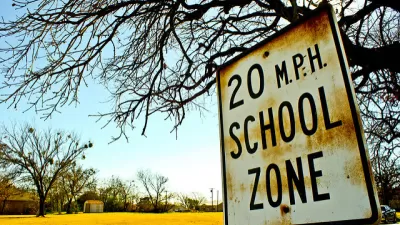Denver, dealing with an increase in traffic fatalities during the pandemic, has lowered speed limits on some residential streets. Critics say the new law neglects the most needed traffic safety changes.

"The default speed limit on Denver’s unposted streets will soon be lowered from 25 mph to 20 mph after the Denver City Council approved the change Monday," reports Hannah Metzger for The Denver Gazette.
"The approved measure will reduce the default speed on city streets where no limit is posted, applying most specifically to neighborhood streets with no center line," adds Metzger. "The Department of Transportation said it will also decrease the speed limits of posted neighborhood streets to 20 mph beginning in 2022."
Councilmember Kendra Black was the sole no vote on the change. The article provides space for the councilmember to make the case that the speed limit changes are targeting the wrong kind of street, with arterials the source of the most carnage on local roads.
Like many other Vision Zero cities, the recent years has been particularly deadly—with the most fatalities since the city announced its Vision Zero initiative in 2016. There does seem to be an uptick in the number of cities lowering speed limits. Norfolk, Virginia was the previous example picked up by Planetizen.
FULL STORY: Denver to lower neighborhood speed limits to 20 mph

Planetizen Federal Action Tracker
A weekly monitor of how Trump’s orders and actions are impacting planners and planning in America.

Map: Where Senate Republicans Want to Sell Your Public Lands
For public land advocates, the Senate Republicans’ proposal to sell millions of acres of public land in the West is “the biggest fight of their careers.”

Restaurant Patios Were a Pandemic Win — Why Were They so Hard to Keep?
Social distancing requirements and changes in travel patterns prompted cities to pilot new uses for street and sidewalk space. Then it got complicated.

Platform Pilsner: Vancouver Transit Agency Releases... a Beer?
TransLink will receive a portion of every sale of the four-pack.

Toronto Weighs Cheaper Transit, Parking Hikes for Major Events
Special event rates would take effect during large festivals, sports games and concerts to ‘discourage driving, manage congestion and free up space for transit.”

Berlin to Consider Car-Free Zone Larger Than Manhattan
The area bound by the 22-mile Ringbahn would still allow 12 uses of a private automobile per year per person, and several other exemptions.
Urban Design for Planners 1: Software Tools
This six-course series explores essential urban design concepts using open source software and equips planners with the tools they need to participate fully in the urban design process.
Planning for Universal Design
Learn the tools for implementing Universal Design in planning regulations.
Heyer Gruel & Associates PA
JM Goldson LLC
Custer County Colorado
City of Camden Redevelopment Agency
City of Astoria
Transportation Research & Education Center (TREC) at Portland State University
Camden Redevelopment Agency
City of Claremont
Municipality of Princeton (NJ)





























